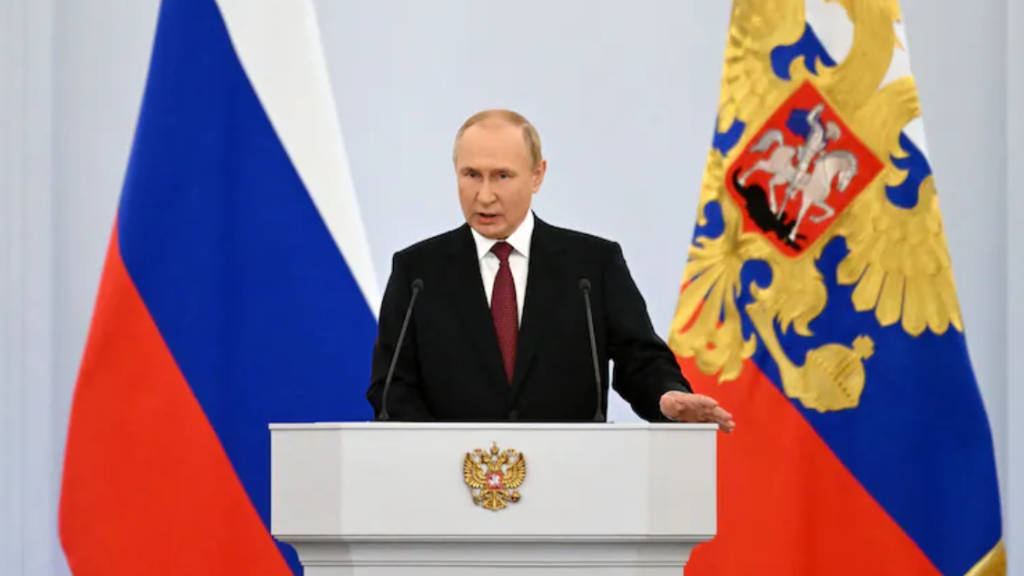The Russian President, Vladimir Putin has welcomed 28 new Foreign Ambassadors to Moscow and delivered a keynote speech to them collectively. The new Ambassadors are the highest diplomatic representatives of the following countries:
Europe
Genc Pecani (Albania), Alexander Rogozhnik (Belarus), Michel Gerebtzoff (Belgium), Ivan Orlic (Bosnia and Herzegovina), Jesper Var (Denmark), Marja Elina Liivala (Finland), Julian Clare (Ireland), Cecilia Piccioni (Italy), Carmelo Inguanez (Malta), Joanneke Marijke Balfoort (Netherlands), and Ricardo Martínez Vazquez (Spain).
Caucasus
Gurgen Arsenyan (Armenia), and Rahman Mustafayev (Azerbaijan).
Africa
Aristide Rapougdondba Ludovic Tapsoba (Burkina Faso), Genet Teshome Jirru (Ethiopia). See also here, Peter Mutuku Mathuki (Kenya), Issa Abdou Sidikou (Niger), and Mark Grey Marongwe (Zimbabwe).
Middle East
Simona Halperin (Israel).
Asia
Vinay Kumar (India) see also here, Akira Muto (Japan), Kubanychbek Bokontaev (Kyrgyzstan), Siphandone Oybouabouddy (Laos). See also here, Dato’ Cheong Loon Lai (Malaysia), and Thit Linn Ohn (Myanmar).
North America
Sarah Taylor (Canada).
South America
Enrique Ignacio Ferrer Vieyra (Argentina).
Oceania
Mark Julian Trainor (New Zealand).
Of these, half could be considered as part of the Global South, have expressed interest in BRICS (India is already a member), and are generally pro-Russia. The other half are mainly pro-Western, with nine of them NATO members. This is what Putin had to say:
Ukraine
“Only those who are unfamiliar with Russia’s history and fail to understand the strength of its unity can indulge in illusions about inflicting a strategic defeat on it. The hostile course taken by several Western states, aimed at escalating and prolonging the Ukrainian conflict to inflict a strategic defeat on our country, is profoundly erroneous. Russia values the genuine desire of its BRICS partners to help resolve the Ukrainian crisis.”
Bilateral Cooperation
“Russia is open to mutually beneficial cooperation with all countries, without exception, based on the principles of equal rights, non-interference in internal affairs, and strict adherence to international law. Moscow stands for the development of a fair system of international economic relations, free from unfair competition, illegitimate unilateral sanctions, and politically motivated restrictions. Russia does not seek confrontation and hopes that Europe will adopt a rational, balanced approach to cooperation.”
Foreign Policy
“Russia’s foreign policy is based on a constructive approach that takes into account both its own interests and global trends.”
The Middle East
“Russia is making every effort to prevent the Middle East conflict from escalating into a major war.”
Armenia and Azerbaijan
“Russia is doing everything possible to normalize relations between Armenia and Azerbaijan so they can sign a peace treaty.”
Summary
With the new Israeli Ambassador in attendance, Putin made it very clear Russia wants peace in the region. Both Armenian and Azerbaijani Ambassadors were also present with Putin laying down Russia’s similar expectations for peace. The same was stressed about Ukraine, with Putin telling the eight new EU ambassadors a similar message and that Russia wanted cooperation, not conflict. Specific mention here was also made to the BRICS in the context of Ukraine, which is increasingly a theme. The recent ‘Kazan Declaration’ issued by the BRICS Heads of State also included statements concerning Ukraine (articles 36, 44 here).
In short, much of Putin’s Ambassadorial welcome was directed toward peace as a step forward in their respective bilateral relations. The message being sent back to their governments was implicitly clear: cooperation, not conflict. To what extent that message is absorbed remains to be seen by at least half of them. It will be interesting to observe what pressures the BRICS half will be able to diplomatically bring to bear upon the Western half during their Ambassadorial postings to Moscow.
Further Reading
The 2024 BRICS Summit: What Was Said About Ukraine

 Русский
Русский













